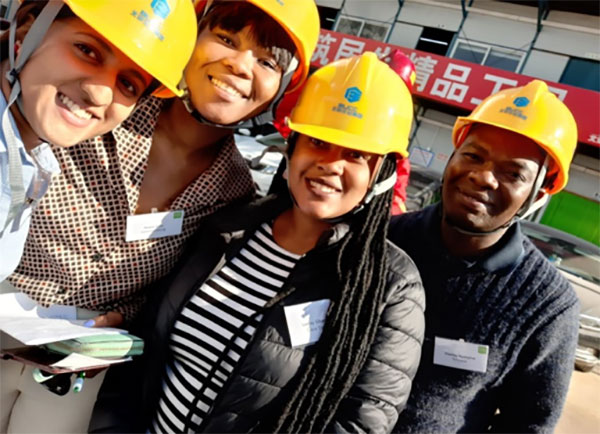
C40 South Africa Buildings Programme
September 09, 2019
Figure 1: The C40 Technical Officers – Naseema Elias (eThekwini), Azola Zulu (Johannesburg), Lesley Sibanda (Cape Town) and Stanley Nyanyirai (Tshwane) taken at the C40 New Building Efficiency network in Beijing, China.
Four South African cities, namely Cape Town, Johannesburg, eThekwini and Tshwane are part of the C40 South Africa Buildings Programme. The three-year programme (2018 – 2020) is supported by the C40 Cities Climate Leadership Group (C40) and funded by Children’s Investment Fund Foundation (CIFF). Sustainable Energy Africa (SEA) is the local implementing partner and manager of the Buildings programme, providing technical support to the cities. A technical officer is deployed in each city to provide additional capacity and to work in cross departmental teams towards net zero carbon building energy performance.
The objective of this programme is to accelerate the development and implementation of transformational energy efficiency policies and programmes, working towards zero carbon performance, for new buildings in South African cities by 2020. This is in line with national policy directions, supports the intentions articulated in the draft National Energy Efficiency and Climate Change Strategies and the National Development Plan, which envisages net zero emission building standards by 2030. In addition, these four cities signed the Net Zero Carbon Buildings declaration at the Global Climate Action Summit in September 2018. A total of 22 cities globally signed this declaration thereby committing to net zero carbon by 2030 for all new buildings and all municipal buildings; and by 2050 for all existing buildings.
To meet these ambitious commitments and the Buildings programme outcomes, all four cities are jointly developing ambitious building energy performance requirements. These will require maximum energy efficiency through integrated passive design, higher performance building envelopes, energy efficient lighting and HVAC, building management systems and appliance specifications, with remaining energy demand increasingly met by small scale embedded generation (SSEG) (and off-site renewables where necessary).
For more detailed information, please contact the programme manager at [email protected].






